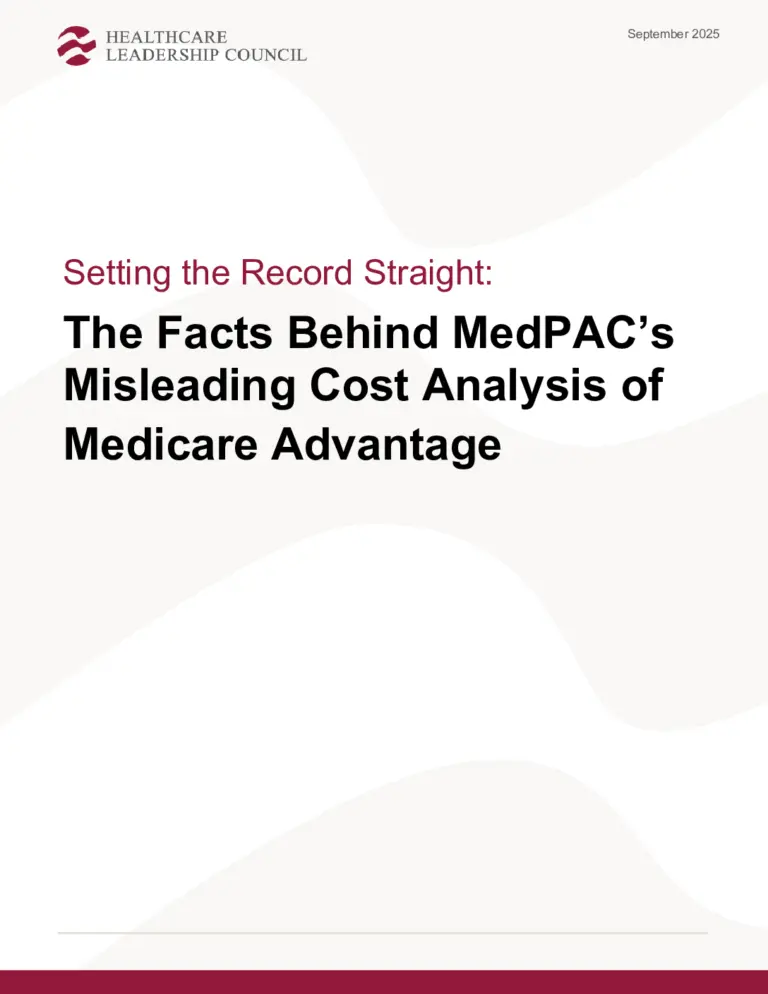Medicare Advantage
HLC is committed to improving the public-private partnership while meeting the needs of beneficiaries and maintaining financial sustainability.

The Issue
More than half of all Medicare-eligible beneficiaries (54%, or 32.8 million people) enrolled in Medicare Advantage (MA) in 2024, a figure projected to reach 60% by 2028. MA, or Medicare Part C, is a public-private partnership through which private insurers offer comprehensive health coverage to seniors and individuals with disabilities as an alternative to traditional Medicare.
Under the law, MA plans must cover at least the same inpatient and outpatient services provided by traditional Medicare Part A and Part B to receive federal Medicare funds which are paid as a fixed monthly amount for each beneficiary’s expected healthcare costs. Within the MA program, a private insurer receives a set amount of federal dollars (sometimes supplemented by small premiums from the beneficiary) to manage the covered beneficiary’s care. The federal dollar amounts vary (are risk adjusted) to account for the health status of the beneficiary based on his/her medical record’s diagnostic and coding information. The program is designed to incent MA plans to proactively manage chronic conditions, reduce avoidable hospitalizations, and improve population health.
Members of Congress and segments of the healthcare industry are increasingly concerned that some medical management tools intended to ensure that the appropriate care is delivered in the appropriate setting are unduly restrictive for providers and beneficiaries. As a result, policymakers are considering reform proposals to provide greater clarity into MA plans’ prior authorization processes, reimbursement timeframes, clinical documentation requirements, marketing practices, and provider networks.
Policy Solutions
HLC supports policies that promote competition and choice in coverage options, reward high-quality outcomes, and improve patient access. To strengthen the MA program and address system-wide concerns, we support the following policy improvements:
Permit Supplemental Benefits to Improve Health Outcomes
Some MA plans offer supplemental benefits that integrate non-medical interventions such as home-delivered meals, transportation to medical appointments, and fitness programs. In addition to these non-clinical benefits that bolster healthy living, some MA plans also offer supplemental health benefits to cover hearing, vision, and dental services, which are not offered through traditional Medicare. Many enrolled beneficiaries find that these interventions prevent and mitigate common and costly chronic conditions, which affect six in ten U.S. adults and drive 90% of healthcare costs. HLC recommends expanding flexibility for targeted supplemental benefits and advancing interoperability.
Ensure the Sustainability of Medicare Advantage
The federal government and the private sector must collaborate to protect the MA program’s financial stability and promote the responsible stewardship of public dollars. Predictability is imperative. However, recent changes to the federal reimbursement formula, such as to risk adjustment and Star Rating, coupled with increased utilization and an aging population, have disrupted the MA market offerings—resulting in a decline in the number of MA plans available nationwide, reductions in supplemental benefits, and an increase in median out-of-pocket limits. HLC recommends ensuring payment sustainability amidst program growth, leveraging data reporting for program improvement, and ensuring accurate and transparent analysis guides policy decisions.
Modernize Prior Authorization to Reduce Administrative Burden
Prior authorization is an important tool to manage the delivery of appropriate, evidence-based care, and reduce unnecessary costs. However, in some instances, its application can create undue hurdles for providers and beneficiaries when processes are inefficient, overly restrictive, or vary significantly across plans. HLC recommends promoting streamlined, electronic prior authorization.

Setting the Record Straight: The Facts Behind MedPAC’s Misleading Cost Analysis of Medicare Advantage
With more than half of Medicare beneficiaries now choosing to enroll in MA, HLC’s report challenges the accuracy of recent MA spending estimates by the Medicare Payment Advisory Commission (MedPAC). It exposes critical flaws in the Commission’s revised methodology underpinning its skewed estimates, and calls for greater transparency in evaluating the MA program.
Medicare Advantage Letters & Comments
HLC letter supporting H.R. 4093, the “Apples to Apples Comparison Act”
Read our letter responding to House leaders expressing strong support for H.R. 4093, the Apples to Apples Comparison Act of 2025.
Group letter to Congressional Leadership opposing the No UPCODE Act
HLC support letter for S. 1816, the “Improving Seniors’ Timely Access to Care Act”
Medicare Advantage News
HLC Appreciates MedPAC Refining MA Cost Estimates, Urges Further Action
In its status report on the MA program presented on Friday, MedPAC announced revised numbers for its estimates comparing the cost of MA to fee-for-service Medicare (FFS), concluding MA will cost the government 114% of what it would cost if those ben…
Healthcare Leadership Council Report Highlights MedPAC’s Misleading Medicare Advantage Cost Analysis
Ghazal: “MedPAC’s change in methodology has created a ‘Wizard of Oz’ illusion, presenting a cost surge when none existed.”A new report from the Healthcare Leadership Council (HLC), an association of CEOs and C-suite executives from all sectors of he…
Majority of Seniors Satisfied with Medicare Prescription Drug Coverage, Concerned with Disruptions on the Horizon Caused by the IRA, Survey Shows
Seniors want lawmakers to focus on stabilizing the program instead of expanding the IRAWashington, DC – A new nationwide survey by Morning Consult, conducted annually on behalf of the Medicare Today coalition, reveals that while nearly 90 percent of…
Explore HLC
HLC is the only group in Washington that unites healthcare CEOs and leaders across all sectors to shape policy that strengthens the system and improves care.